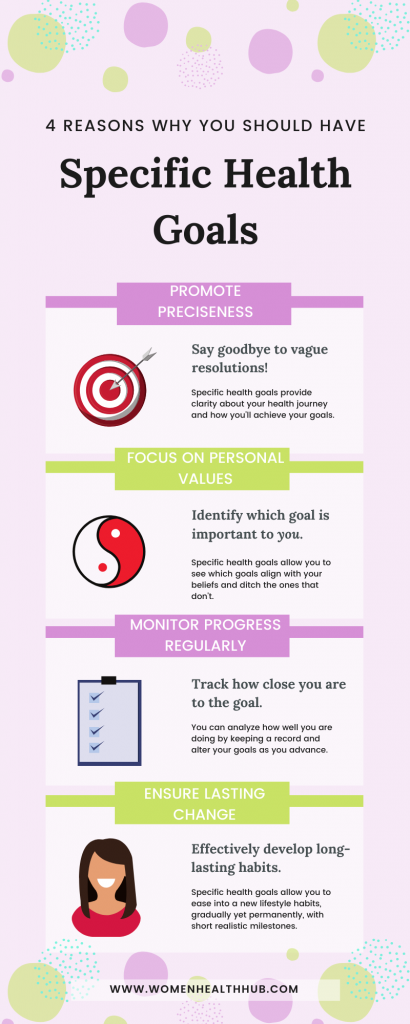Hey there! This post may contain affiliate links. As an Amazon Associate, I earn a teensy commission from qualifying purchases when you buy through these links (at no additional cost to you). For more info, please check the full disclaimer.
Do you ever get frustrated when you make new health goals every year but fail to stick to them after the first few weeks?
Me too. It sucks!
No matter how many times you chant “new year, new me,” it’s a real struggle to find inner motivation and inspiration to change your old habits.
And sometimes, the actual problem is not even the lack of motivation.
Instead, all you need is an action plan that helps you commit to your goals 100%!
That’s why it’s high time we ditch the conventional “new year resolution” trend and focus on developing “specific health goals” every year.
In this blog, you’re going to learn why it is important to have actionable health goals and how to craft the perfect health goals for yourself. I’ve also included a set of free downloadable health checklists with 100+ actionable health goals ready for you.
Pretty cool, right?
You can learn more about these free printable checklists here.
So let’s jump right to it.
Why Don’t New Year Resolutions Work?
According to U.S. News and World Report, more than 80% of the new resolutions are forgotten or ditched after a month.
This is a huge loss!
Arianna Huffington, the owner of Thrive Global, explains the reason beautifully, “The problem isn’t in our goal to change our behavior or make our lives better in some way. The problem is how we’re going about it.”
In other words, it’s all about the goal-making method.
I’ll explain a few causes behind aborted resolutions considering a relevant example.
Let’s say you love to eat meat, but most of your friends follow a strict no-meat diet. After discovering the many benefits of this lifestyle, you wish to quit eating meat altogether.
Your new goal must be something like “I should stop eating meat this year.”
Keeping this example in mind, let’s go through the 4 main reasons why this resolution might fail.
Common Mistakes That Might Cost You Your Health Goals

Mistake #1: Your goal is too vague
We can’t stick to our New Year’s resolutions because we only imagine the destination and neglect the journey.
Most resolutions are too general and contain no particular targets. They also fail to determine a path needed to achieve the goals.
You want to stop consuming meat every day, but how will you accomplish it? What will be your action plan? How will you develop this habit bit by bit?
To make your goals more specific, ask yourself questions like…
- How often will you eat meat?
- How much will you eat in the first quarter, and how will you reduce your intake in the following ones?
- What will you do if you have a severe craving for meat?
- Will you allow yourself any cheat days?
Without sketching out the details of any goal or habit you aim to develop, it would be difficult to practice it every day successfully.
Mistake #2: Your resolution may not align with your values
I came across this point in a Forbes article by Dawn Graham about failed new year resolutions and absolutely loved it!
Dawn says that most of us set unrealistic goals that might not align with our values but are a result of peer pressure.
“A “should” is something that usually comes from societal pressure.
Often these “shoulds” become our goals. Not because they’re important to us, but because we create a belief around them. (E.g., doing this will make me a better person, or healthier, or liked).”
You have to figure out whether you want to achieve this goal for yourself or the people around you.
If you badly want to quit meat, instead of saying, “I should stop eating meat this year,” go for a stronger choice of words such as, “I will consume meat twice every month this year.”
This removes any weakness from your resolution, making it seem like a half-hearted attempt to change.
Mistake #3: You seek quick results
Changing your habits or lifestyle can be slow because it requires behavior modification.
You cannot expect to make big changes in your life in a week!
And usually, you can’t develop a habit within 21 days or something. That doesn’t work every time, especially if you’re starting from scratch.
Humans need time to adjust physically and mentally to the changes in routine and habits.
In this case, let’s assume you’ve been eating meat regularly for decades. Of course, it won’t be easy to quit without giving yourself some room to accommodate the change.
Start by gradually decreasing meat intake instead of quitting altogether. That’s one of the easiest ways to build habits, particularly the ones that require major lifestyle changes.
Impatience will never yield the results you’re looking for. Be patient and give yourself some space to make mistakes.
Which brings me to my next point.
Mistake #4: You get discouraged too soon
We often miss one day of our goal, and lo behold – it feels as if the world has ended! Right?
Believe me, I’ve been there.
2 years ago, I wanted to begin journaling. I got this amazing notebook and accessories and spent the entire December decorating and filling up pages with various habits I wanted to develop.
New Year came. I had a rough start and couldn’t fill the journal. Naturally, I gave up!
Why?
Because I couldn’t handle being a human with some extra responsibilities. 😒
Here’s the thing.
First, accept that you have a life and responsibilities. You may have emergencies to deal with, a family to look after, and you might even get sick sometimes.
Bottomline, the risk of skipping a few days of your goals is always there.
But that’s no reason to give up on your goals entirely.
The thing is to make sure these days are rare. Allow yourself one cheat day per month! This will give you enough room to return to the habit immediately.
So now you know why lame ol’ resolutions don’t work.
Instead, you should craft specific and actionable health goals to improve your wellbeing for good.
What’s So Special About Specific Health Goals?
In the article I shared earlier, Arianna supports the idea of breaking your ultimate goal into actionable milestones to achieve a long-term behavioral change.
According to her, following small milestones together greatly impacts our lifestyle and habits.
This is somewhat similar to the SMART goals framework, the technique I use to create specific health goals.
SMART means…
S – Specific
M – Measurable
A – Attainable
R – Realistic
T – Time-bound
SMART goals give you a clear sense of direction and help you identify a path to successfully achieve your targets.
When you apply them to your health goals, you set realistic and attainable milestones with periodic self-assessment to note how close you are to the ultimate change.
This is the same method I used to design more than 100+ ready-to-use health goals for you. Check out the product details for health goals checklists here and download them right away!
How to Create Specific Health Goals?
When crafting a resolution, keep in mind the following criteria:
- Specific: Determine the exact result you wish to achieve, and don’t be afraid to add details to make it as unambiguous as possible.
- Measurable: Be clear about what you’ll experience or see after you achieve your goal for trackability.
- Attainable: Your goal should be easily achievable and practical and include ample time for adjustment.
- Realistic: Each resolution should align with your values or beliefs to ensure success.
- Time-bound: Identify a timeline to analyze your progress and dedicate a deadline for proper results.
Now let’s go back to the earlier resolution, “I should stop eating meat this year.”
Following the SMART framework, we need to rephrase and make it more specific to your current lifestyle.
Here are a few examples:
- “I will eat meat once every two weeks.”
- “I will eat meatless meals 4 nights a week.”
- “I will eat meat at lunch once a week.”
- “I will eat meatless breakfast 10 mornings a month.”
- “I will eat the smallest piece every time I have chicken for dinner. ”
Do you see a pattern?
Each goal here is easy to attain and gives you enough room to adjust and ease into this change.
Instead of pushing it all at once, they allow you to get comfortable with the routine bit by bit.
Yes, for now, these goals are somewhat beginner-level. If you see improvements and feel you are up for a challenge, you can modify them in the next few months.
- “I will eat meat once every three weeks.”
- “I will eat meatless meals for one week every month.”
… and so on.
It is very important to change your goals as you develop healthy habits.
And in this case, your ultimate resolution is to quit meat intake altogether.
Therefore, analyze your progress periodically and keep altering the goals as you become comfortable with the changes.
3 Helpful Tips to Follow Through on Your Health Goals
Use these tips to follow through on your health goals and achieve them successfully before the year ends.
Tip #1: Have a proper goal-monitoring system
Keep track of whether or not your actionable health goals are making a difference in your life.
To do this, prepare a system for analyzing your progress.
You can either manually note the improvements in a journal or phone or print the results and paste them into your room.
This will help you see the bigger picture and the impact of these goals on your overall lifestyle. You’ll be more mindful of how your routine practices affect your wellbeing.
Whatever method you choose, ensure that it remains consistent throughout the year.
Changing your monitoring method mid-month or mid-year would only increase complications and throw you off the task at hand.
Tip #2: Follow a regular schedule
One way to make these health goals a part of your routine is to carry them out at a dedicated time.
Let’s consider the earlier example of quitting meat. The best way to follow through on this resolution and develop a lasting habit is to dedicate a specific time daily to an activity.
You can start by going strictly meatless for any one of your daily meals. This means you won’t have any meat for breakfast, lunch, or dinner during the whole week.
The idea is to stick to a regular schedule to carry out this practice and prepare your mind and body for this change.
Set a daily reminder in your calendar and avoid missing any goal deadlines.
Eventually, you’ll get used to this rewarding change and stop drooling every time you see your favorite burger!
Tip #3: Edit your resolutions as you evolve
Even though you’ll begin with easy-to-attain targets, you can easily modify them to make them more challenging per your needs.
If you feel you can take up more responsibilities or make headway with advanced health goals, make changes right away.
Remember, you can always go back to your original goals. Don’t push yourself too hard, and don’t take any small mistakes to heart. You’re a human, after all.
The Bottomline
I hope you understand the basics of crafting health and wellness goals. Don’t forget to download your free health checklists with 100+ health goals below!
I wish you a healthy year ahead! 🙂









2 comments
This is great advice. I definitely get frustrated if I don’t get quick results!
Yes! Great tips! I love following a schedule. I love making planning my workout list for the week and plan out my rest days that way I stick to it and know exactly when I get to rest my body! 🙂